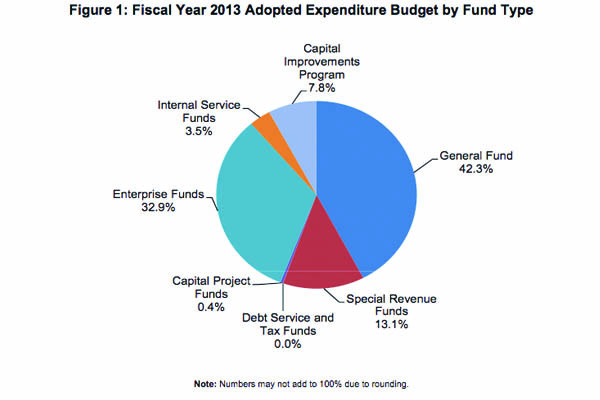San Diego City Services Will Deteriorate Under FY 2013 Budget


According to the City's report, San Diego’s budget for the 2013 fiscal year was saved, “Through a combination of organizational downsizing, cost savings measures, reforms, and program and service cuts, the structural budget deficit has been solved, and projected revenues are expected to support current service levels.” But some critics call the report misleading, pointing to San Diego city services as a particular example of the City's poor fiscal health.
San Diego Unified School District Vice President, Scott Barnett says,
“Any citizen of San Diego can easily tell that the City of San Diego has not eliminated its structural deficit. The terrible condition of our city park facilities, the plethora of pot holes and even the backlog of changing light bulbs in our traffic signals are the most obvious signs that the city is underfunding its basic ongoing needs, thus continuing to have an unreported structural deficit.”
The city's general fund includes a $1.15 billion for core community services like police/fire protection ($609 million), parks and recreation ($86 million), library funding ($39 million), and environmental services ($34 million). This is a $24 million increase from 2012. The general fund is paid for via taxes like property tax, sales tax, and the transient occupancy tax. Though the general fund has grown by 3.2% from 2012, the funds comprising the rest of San Diego’s revenues have declined. The other, nearly 58% of the budget, has shrunk by 177 million.
With a decrease in revenues by 5.5% and expenditures dropping $43 million (1.5%), there is a $138 million gap between total expenditures and total revenues. Yet the budget report states:
“Current revenues are sufficient to cover current services, and the projected deficit for Fiscal Year 2013 that was identified in the Fiscal Year 2013 - 2017 Five-Year Financial Outlook has been solved.”
The budget report cites two factor that provided the solution: the SDCERS Annual Retirement Contribution costs for 2013 are lower than anticipated and revenues have been stronger than projections reported.
The budget report continues, “Projections of future revenues are expected to equal or exceed future expenditures related to the current service levels, signifying an end to further service reductions and the use of one-time funding for on-going obligations.”
Despite this optimistic characterization, critics often point to San Diego’s crumbling infrastructure as a template for how critical services are going underfunded.
San Diego’s roads are often seen as an indicator of San Diego's relative fiscal health. So the question remains, does the budget allocate enough funds to adequately fund infrastructure repairs? The Independent Budget Analyst’s recommendation:
“The service levels established in the Five-Year Deferred Capital Program Funding Plan, approved by City Council on March 20, 2012 will slow the rate of deterioration of streets … to 5-10% … Based on an average deterioration rate of 7.5%, this will result in 38.9% of streets in Good condition, 33.3% in Fair condition, and 27.9% in Poor condition. This funding plan represents a reasonable level of funding given tight financial constraints…”
Although a large disparity still remains between revenues and expenditures, previous deficit growth projections have been halted, technically ending the City’s ‘structural-deficit.’ Nevertheless, arguments made by citizens like Scott Barnett will gain credibility as long as core city services deteriorate.



